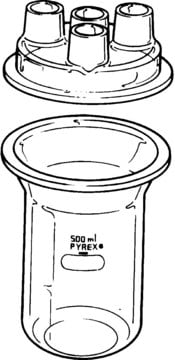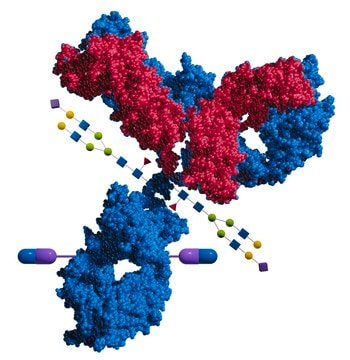MABC530
Anti-CEP Antibody, clone Das-1 (7E12H12)
clone 7E12H12, from mouse
Synonym(s):
Colon epithelial protein, CEP, Das-1 protein
About This Item
ELISA
IHC
IP
WB
dot blot: suitable
immunohistochemistry: suitable (paraffin)
immunoprecipitation (IP): suitable
western blot: suitable
Recommended Products
biological source
mouse
Quality Level
antibody form
affinity purified immunoglobulin
antibody product type
primary antibodies
clone
7E12H12, monoclonal
species reactivity
human
technique(s)
ELISA: suitable
dot blot: suitable
immunohistochemistry: suitable (paraffin)
immunoprecipitation (IP): suitable
western blot: suitable
isotype
IgMκ
shipped in
wet ice
target post-translational modification
unmodified
General description
Specificity
Immunogen
Application
Western Blotting Analysis: A representative lot detected elevated CEP (colon epithial specific protein) levels among intraductal papillary mucinous neoplasm (IPMN) patients samples with high-risk/malignant lesions (Das, K.K., et al. (2014). Gut. 63(10):1626-1634).
Western Blotting Analysis: A representative lot detected CEP in colon adenocarcinoma cell line LS180 and in isolated colon epithelial cells, as well as in LS-180 culture supernatant, but not in normal jejunal epithelial cells (Kesari, K.V., et al. (1999). Clin. Exp. Immunol. 118(2):219-227).
Immunoprecipitation Analysis: A representative lot co-immuoprecipitated tropomyosin 5 with CEP from the culture supernatant of human adenocarcinoma cell line LS180 (Kesari, K.V., et al. (1999). Clin. Exp. Immunol. 118(2):219-227).
ELISA Analysis: A representative lot was used as the capture antibody in combination with the isotype switched mAb Das-1 IgG as the detection antibody using purified CEP and cyst fluid samples from Intraductal papillary mucinous neoplasm (IPMN) patients (Das, K.K., et al. (2014). Gut. 63(10):1626-1634).
Immunohistochemistry Analysis: A representative lot detected significantly higher CEP (colon epithial specific protein) immunoreactivity among intraductal papillary mucinous neoplasm (IPMN) patients samples with high-risk/malignant lesions (Das, K.K., et al. (2014). Gut. 63(10):1626-1634).
Immunohistochemistry Analysis: Representative lots detected CEP (colon epithial specific protein) immunoreactivity by both fluorescent and non-fluorescent immunhistochemistry in colonic, but not small intestinal, enterocytes using both frozen and formalin-fixed, paraffin-embedded tissue sections (Moriichi, K., et al. (2009). Int. J. Cancer. 124(6):1263-1269; Piazuelo, M.B., et al. (2004). Mod. Pathol. 17(1):62-74; MIrza, Z.K., et al. (2003). Gut. 52(6):807-812; Glickman, (2001). J.N., et al. Am J Surg Pathol. 25(1):87-94; Griffel, L.H., et al. (2000). Dig. Dis. Sci. 45(1):40-48; Hamilton, M.I., et al. (1995). Clin. Exp. Immunol. 99(3):404-411; Halstensen, T. S., et al. (1993). Gut. 34(5):650-657; Das, K.M., et al. (1987). J. Immunol. Vol. 139(1):77-84).
Dot Blot Analysis: A representative lot detected CEP immunoreactivity in colon protein extracts (Hamilton, M.I., et al. (1995). Clin. Exp. Immunol. 99(3):404-411).
Quality
Immunohistochemistry Analysis: A 1:1,000 dilution of this antibody detected CEP in human colon tissue.
Target description
Physical form
Other Notes
Not finding the right product?
Try our Product Selector Tool.
Storage Class Code
10 - Combustible liquids
WGK
WGK 2
Flash Point(F)
Not applicable
Flash Point(C)
Not applicable
Certificates of Analysis (COA)
Search for Certificates of Analysis (COA) by entering the products Lot/Batch Number. Lot and Batch Numbers can be found on a product’s label following the words ‘Lot’ or ‘Batch’.
Already Own This Product?
Find documentation for the products that you have recently purchased in the Document Library.
Our team of scientists has experience in all areas of research including Life Science, Material Science, Chemical Synthesis, Chromatography, Analytical and many others.
Contact Technical Service







